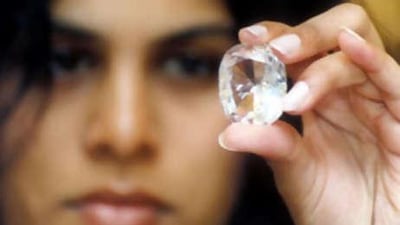NEW DELHI // India is planning to launch a UN-backed international campaign to retrieve from Britain historical artefacts taken during colonial rule, a move that could lead to rare co-operation with neighbouring Pakistan. India had renewed its long-time demand this month that Britain return the many historical and cultural objects, including the legendary Koh-i-Noor diamond, that are now housed in British museums, but a spokesperson for the British High Commission in Delhi rejected India's claims.
At the same time, Pakistan is also planning to launch its own diplomatic and legal campaign to reclaim from Britain pieces of its national heritage taken during the same period. Before partition in 1947, what is now Pakistan was then part of British-ruled India. The Indian plea to Britain was made on June 1 by the Archaeological Survey of India (ASI), the government agency responsible for the historical monuments and artefacts. It follows decades of unsuccessful lobbying by India.
Gautam Sengupta, the director general of the ASI, said India will launch a campaign with the support of Unesco - the UN's cultural, scientific and educational body - and other countries to reclaim their historical riches from Britain. "As efforts so far to reclaim stolen treasures have proved futile, Unesco support is required for launching an international campaign to achieve this end," said Mr Sengupta.
"Not only India - various other countries like Mexico, Peru, China, Bolivia, Cyprus and Guatemala have also voiced the same concern to get back their stolen and looted antiquities and to join the international campaign." Mr Sengupta declined to comment on whether there will be efforts to include Pakistan in the international campaign. Experts say the innumerable number of artefacts in both public and private museums in Britain has remained the biggest hurdle for governments - like India's - to reclaim them.
Suresh Kumar, a New Delhi-based antiques collector, said governments "have to pick, choose and pursue" artefacts individually rather than all at once because of the legal complexities of each individual case, prolonging the task of retrieving them. He suggested that governments should encourage private parties to come forward and buy artefacts of national importance during auctions at museums as a way of getting the objects back into local hands.
Among the artefacts that India is looking to take back from British museums is the centuries-old Koh-i-Noor diamond, which was taken from Lahore in Pakistan; the Badshahnama, a historical document that belonged to the Mughal Emperor Shah Jahan; a figure of the mythical Huma bird that was part of the throne of Tipu Sultan, the king of Mysore; and the throne of Ranjit Singh, who was the king of Punjab.
But Akhilesh Mittal, a historian and columnist for New Delhi's Sunday Guardian newspaper, said the disputed ownership of the artefacts was just a tactic by the British. "If that had been the case, there was no reason why the British would not return Greek Elgin Marbles because of its sole ownership," he said. Mr Mittal, who wrote a letter to Queen Elizabeth in 2007 asking her to return relics taken from India, said the artefacts have none of the historical and emotional significance for the British that they do for Indians. "Most of the objects are held like prisoners of war. They mean nothing to the British; they are important to Indians."
Pakistan is also embarking on a campaign of its own to have historical objects returned. The culture minister Pir Aftab Hussain Shah Jilani said his country will prepare a list of artefacts and will take up the matter with British authorities. Pakistan made a similar but unsuccessful attempt in 1979. "We haven't taken up the issue for some time, but certainly it has remained Pakistan's long-standing demand that Britain returns all the cultural and historical artefacts to their legal owners," said Mr Jilani.
"We will certainly seek the return of these artefacts from the British." Both India and Pakistan have individually made several unsuccessful attempts in the past to reclaim historical artefacts from Britain. The UK maintains that the artefacts have been legally acquired by them and British laws do not allow them to return it to the country - or countries, in this case - of origin. Mr Jilani said better results could be achieved if Pakistan worked with other countries, apparently including India, who are also looking to take artefacts back from Britain.
"We are a party to all those artefacts taken away by the British during colonial rule. It's the people of this region that have the right to keep the artefacts. We will approach other countries whose national treasures are lying with Britain to make our case stronger. Many historians agree that India and Pakistan stand a better chance by pooling their efforts. "Both the countries can evolve a system of sharing and exhibiting these artefacts on a mutually agreed platform," said Rajat Dutta, a professor of history at New Delhi's Jawaharlal Nehru University.
"Whether India and Pakistan agree or disagree for political reasons … both the countries share a common history."
foreign.desk@thenational.ae

